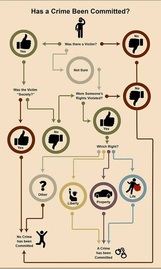 A handy flowchart I found. It basically explains my definition of crime
A handy flowchart I found. It basically explains my definition of crime
As readers of previous posts and my facebook page are well aware, I use these terms quite frequently. I have come to realize that, despite my best efforts to contextualize the use of these terms, many people are either unable or unwilling to understand what I mean by crime, vice, and sin. Today, I plan on setting things straight such that I don't have to explain it quite as frequently.
As can easily be guessed, being a philosopher and an anarchist, I do not believe the contemporary and common use of the term “crime” is valid. As I have expressed already, the laws of man are inherently unjust; as such, the term “criminal” cannot apply to an identical class of things as the term “illegal”, as is commonly assumed in our culture. Instead, I define a crime as any action intentionally or negligently directed at the invasion or destruction of another's life, liberty, or property. In other words, it is an action which violates someone's rights or duties.
Easy examples consist of incidents of murder, coercion, and theft. Some such instances of these crimes are difficult to discern outright, as would be the case of unreasonable bank fees, protection rackets, systematic coercion, or deprivation of life essentials. There exist any number of examples that could be presented. It is crucial to have a clearly defined set of necessary and sufficient conditions for what is to be considered a crime for reference in these more veiled instances of crime, given the dire consequences. (see “What is the State of War?” http://madphilosopher.weebly.com/blog/what-is-the-state-of-war).
I doubt anyone is reading this, let alone anyone accepts or wishes to help me refine these conditions, but I am compelled to attempt a definition. The result should be intuitive, but still analytically sound such as to justify one's response. I believe that if one demonstrates resolve with regards to performing an action, has a demonstrable ability to perform such an action, and the action in question is an immediate or direct and demonstrable causal violation of someone else's life, liberty or property, the action in question is a crime. In this way, holding a gun to someone's head and demanding a particular behavior or taking someone else's property without consent is a crime. Conversely, making idle threats, wishing cancer at people, and using incandescent light bulbs are not crimes as they do not meet the conditions I have outlined to be necessary and sufficient.
Now is a good time to point out why my definition of a crime possesses more utility than the non-aggression principle (NAP). The most commonly accepted iteration of the NAP can be and is used to justify coercing, stealing from, and even murdering people for things like using incandescent light bulbs, belonging to a different community, smoking tobacco, driving a car, refusing vaccines, and just about any other non-criminal action that could be considered a nuisance by some. These justifications are logically consistent when using the NAP as one's initial premise. Of course, attempting to do such things to someone for using the wrong light bulb is, itself, aggression. The issue hinges on people's definition of “aggression”, and any definition which does not result in counter-intuitive or absurd claims will be equivalent to my definition of crime. A similar issue arises with the less popular objectivist “non-initiation of force” principle.
If I were to simply claim that my definition of crime and prescription as to how to handle it were the extent of moral and ethical reasoning required, we may very well witness a conservative's nightmare: legions of communist, polygamist, sodomites freebasing coke and praying to Allah simply because it isn't a crime to do so. Of course, it's equally likely that we would see a liberal's nightmare emerge: mobs of tobacco-chewing, corporatist, racist, fundamentalist Christians chugging liters of soda while deforesting the amazon. What I am alluding to, obviously, is that there are courses of action which are not crimes but are not conducive to human flourishing. The main focus of this portion of the post is vice. A vice is any non-criminal activity which would prevent or inhibit the participant from pursuing their telos.
Again, I am guilty of referencing my still-unfinished book. A quick primer is in order. “Telos”, a Greek term which has been at the center of philosophical discourse since Aristotle, essentially means “end” or “purpose”. I argue that any individual is beholden to a certain hierarchy of teloi (plural of “telos”), but that is a discussion best left to my book or later posts. For now, we can simply say that eudaimonia is any individual's ultimate goal. Another Greek word: “eudaimonia” is a very technical and precise term which, for our current uses, can be reduced to “free and productive flourishing”.
Any activity which would limit one's freedom, productivity, or well-being can be considered a vice. Addiction, mind-altering substances, dependency, time-wasting activities, body-harming practices, character-undermining activities, prophylactics... essentially the traditional list of vices are good examples of what can be considered a vice. Now, am I a tee-totaling puritan hellbent on avoiding anything fun? I play video games, drink alcohol, smoke cigars, stay up late, work a 40-hour wage-slave job, and so much more. I am still dependent on others' skills and resources. I still rely on less-than-perfect activities to sublimate my aggression and discomfort. I still use Google, Facebook, and Windows. In other words, I still have my vices.
As I will likely discuss in an upcoming post, the virtues of prudence and temperance are paramount in flourishing. With regards to handling vice, prudence and temperance are also key. While it would be ideal for people to simply commit to being a taoist or stoic sage, an ascetic monk, or whatever and eschew all vice outright, it is not entirely possible and may, itself, be a vice of sorts. Instead of abandoning the real world for some gnostic exercise in death, most people may flourish best by approaching their own vice from the perspective of a responsible cost/benefit analysis. There is a reason I smoke cigars rarely as opposed to mainlining heroin daily.
Whereas “How do I deal with criminals?” warrants a near-infinite number of discussions, “How do I deal with a vicious person?” is pretty straightforward. If one's vices are, in fact, vices and not crimes, they ought to be free from coercion, murder, or theft, like any other human being. If their vices are beyond the realm of tolerance, such as someone vigorously masturbating in public, they can be refused service, reprimanded, shunned, etc. The social norm can be enforced without resorting to criminal actions against someone. Social norms, tolerance, and exile are ideas that will be more thoroughly explored when I get around to talking about cities, the Dunbar number, and intentional communities.
If any of my nine readers are Christians, they are likely pulling out their hair and screaming, “SMOKING WEED WILL LAND YOU IN HELL!” I jest. In all seriousness, though, a great many vices and all crimes are sins. If a crime is someone violating another's rights and a vice is someone preventing their own flourishing, where is sin in this whole mess? I'm going to try to keep this short and sweet. So far, I've written very little on relationships. There are a handful of reasons this is the case, but now I'm compelled to do so.
Sin is relational. I can pretend that I have a relationship with you, my anonymous, silent reader. If I start hiding pictures of my manhood in my posts or if every post were to gradually devolve into senseless diatribes against Ronald McDonald and the lizard Jews, I would be damaging my relationship with those of you who expect philosophy from me. I would be sinning against you.
If I am in relationship with an omnipotent, omniscient, omnivalent, omnibenevolent, omni-omni, being... especially one that created me personally for the sake of us coming into full communion with each other... any action which would make me less omni-omni and therefore less able to come into communion with Him would be a sin against Him. The same applies to any action which would otherwise damage our relationship.
TL;DR: If someone is intentionally and willfully acting in direct violation of another's rights, they are committing a crime. If someone is doing something which prevents or inhibits human flourishing but isn't a crime, they are committing a vicious act. Sin is any activity which damages a relationship. In this way, sins against God would be actions which damage one's relationship with God. As always: you ought to defend yourself from criminals, reprimand and ignore vicious people, and avoid sin.


 RSS Feed
RSS Feed
